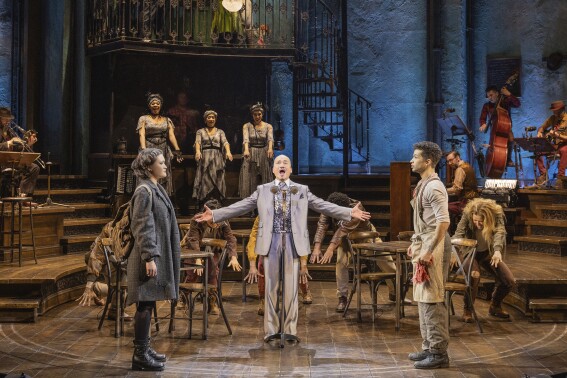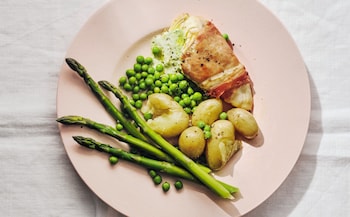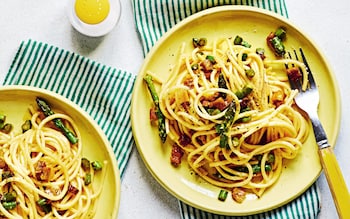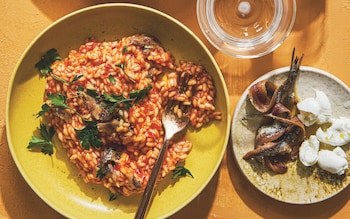As the head girl and deputy head girl of their sixth form, Ruby Fuller and Jessie Ross joked that they would take the top two roles in Downing Street in years to come.
“We always said each other would be better at being prime minister,” says Jessie. “‘No, you go on, I’ll be deputy.’”
They met in maths class at Charter School North Dulwich aged 13, and became best friends. They sang Taylor Swift together, they made each other cry with laughter, they were self-proclaimed “nerds”. It was a friendship marked by love, with all the intensity of adolescence.
When Ruby became ill with a rare blood cancer aged 17, their relationship endured and deepened. They played board games in hospital and gossiped about school in between treatments. Ten months later, on May 15 2020, Ruby died.
Almost three years later, Jessie, now 22, is trying to articulate the loss she still carries. “It was an earth-shattering shock when she was diagnosed.
“When you’re close with someone, your relationship is something you carry together, and when they die you continue to carry it on by yourself, in a different way. People think that you might move on from grief, but you can’t – you learn to live with it.”
We are in the bright, warm kitchen of the family home where Ruby grew up, and Ruby’s mother, Emma Jones, is also at the kitchen table with Jessie. Pictures of Ruby – along with her younger sister, Tabitha – are hung around the room, and stuck by magnets to the fridge.
Captured in her adolescence, she has clear, smooth features, and an inquiring, slightly quizzical expression.

“Live loudly, live kindly” reads a bright, pop-art poster – Ruby’s motto by which she lived and wanted to be remembered.
Ruby’s cats – “very much hers” – slink around the room. There is warmth and a sense of humour in the names she chose for them: Pacifica after a family holiday, Mouse, and the pitch-black Blue.
A beagle-cross dog, Halloumi, joined the family at Ruby’s request during her illness, to help her younger sister cope after her death.
“She was so constantly thinking about everyone else around her, even when she was ill, how they were and how they would react to her illness,” says Jessie.
“Ruby was a very optimistic person, but not in the sense of ignoring things or pretending everything is OK.
“She would campaign for environmental justice, for example, but she would also spot a person sitting quietly by themselves to speak to them, or she would remember everybody’s birthdays and make brownies for them.
“It’s very easy to say that a dead person was loved by everyone, but Ruby, sincerely, was really loved by everyone”

One way Jessie is able to channel her love for Ruby is through volunteering with the blood cancer charity Anthony Nolan – for which she has worked since the early days of her friend’s illness. The organisation, founded in 1974 by Shirley Nolan after the death of her son from a rare blood disorder, manages and recruits stem cell and blood donors to the national register.
The first contribution Jessie made was at a school assembly in year 13 run by the charity, in which she described Ruby’s diagnosis with T-cell lymphoblastic lymphoma. After the presentation, half of the sixth form signed up to become donors.
“The speech was very personal to me,” says Jessie, recalling that “very strange” day when everyone else learnt about Ruby’s serious cancer. “I felt a duty to represent what was going on with Ruby, in the right way.”
On the last day of year 12, Ruby was diagnosed with T-cell non-Hodgkin’s lymphoma, which later morphed into leukaemia. Ruby and Jessie were booked to fly to Croatia on holiday a week later. Instead, on the day of their flight, she was in an ambulance being transferred between King’s and St George’s hospitals in London.
Over that summer, Jessie gradually adjusted to a new life of hospital visits. Sometimes Ruby would be feeling very sick, so she would stay for only 20 minutes; sometimes Jessie would bring a snack of chocolate rice crispy cakes at Ruby’s request; sometimes they would chat for hours, playing games – including the raucous “F--k The Game”. (“It could get quite noisy in the ward when we got into that”, says Jessie.)

Ruby loved school, and would probably have studied geography at university, perhaps at Oxford. She was deeply frustrated at not being able to return to A-levels, and worried that her illness would impact her friends’ exams.
Jessie and Emma’s faces seem to shine as they recall memories of Ruby, but they do not gloss over the intense difficulties of her treatment during lockdown. “Chemotherapy is brutal…” says Emma, her voice trailing away.
One drug led to Ruby developing psychosis. On some days she vomited all day, on others she was too weak to talk. At one point, Ruby had to sign a form for a new course of chemotherapy, which warned there was a possibility of the treatment itself killing her. “‘Oh great’,” she deadpanned, says Emma, “‘either it’s certain death or it’s a 16 per cent chance of death.’”
And yet some semblance of ordinary life continued, even in the most difficult times. “You might think that when you have a life-threatening illness normal things stop mattering,” says Jessie, “like A-levels and crushes and holidays – like all the things that make you a human.
In fact, Ruby wanted to know the school gossip, she wanted to share pop songs still.” The release of Taylor Swift’s “Temptation” [The 1] was, she adds, “a big deal for us.”
As part of her treatment, Ruby received a stem cell transplant in January 2020. Initially this seemed to produce positive results. But a more aggressive form of the cancer returned in April, and she died three weeks later, at the height of the first Covid lockdown.

Forced to say goodbye to friends and family over Zoom, with no public funeral, her death came on what turned out to be the same day as one of the notorious Downing Street parties.
It was an episode movingly included in Channel 4’s Partygate drama, in which Emma says to camera: “To think they were breaking the rules without a care while my daughter lay dying is infuriating.”
Today, raising awareness around the vital importance of stem cell donations is the key focus for Jessie’s work. In particular, she encourages teenagers and people in their 20s to sign up to the register: the younger the donor, the more effective the treatment.
In 2012 Anthony Nolan became the first organisation to take donations from 16-year-old boys – the most useful but hardest-to-reach donors. For Jessie, volunteering is not only hugely rewarding, but also a continuation of her friendship with Ruby.
“There was this interest in social justice and sharing a sense of purpose which was part of our friendship, as well as the fun and silliness and the heart-to-hearts.

Emma confirms that the girls’ relationship brought out the best in them both. “Ruby was deeply influenced by the kind of moral integrity and political awareness she shared with Jessie. That rocket-fuelled her commitment to causes, so it was a very positive relationship in that way.”
Jessie nods enthusiastically at this. “The things that mattered to Ruby when she was dying, they weren’t tokenistic, they were real. She asked that instead of buying her family flowers, people donate to blood cancer research and I think that speaks to the kind of kindness she was interested in.”
I ask Jessie if she would go into politics, motivated by her and Ruby’s desire to change the world. “Hmm, I’ll give a politician’s answer – let’s just say, Ruby and I were never under any illusions about politics. I think I would prefer to go down the campaigning route,” she says.
And in the end that campaigning meant that Jessie did not have to wait long to get to Downing Street, though not as prime minister – or deputy PM.
Last month, she was invited to a reception to celebrate the 50th anniversary of Anthony Nolan.

Would Jessie have become involved with campaigning work if Ruby had not died? “If she had never become ill, absolutely not,” she says. “I barely would have known what a stem cell transplant was.
“I think if she had recovered I would have. We would have done it together.”
Ruby’s family and friends are fundraising £500,000 for research into blood cancer. You can donate here.
Disclaimer: The copyright of this article belongs to the original author. Reposting this article is solely for the purpose of information dissemination and does not constitute any investment advice. If there is any infringement, please contact us immediately. We will make corrections or deletions as necessary. Thank you.



